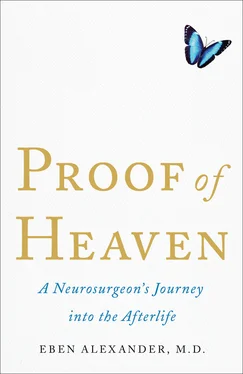Thinking about it later, Phyllis said that the one thing she remembered above all else about that week was the rain. A cold, driving rain from low-hanging clouds that never let up and never let the sun peek through. But then, that Sunday morning as she pulled her car into the hospital parking lot, something strange happened. Phyllis had just read a text message from one of the prayer groups in Boston saying, “Expect a miracle.” As she pondered just how much of a miracle she should expect, she helped Mom step out of their car, and they both commented that the rain had stopped. To the east, the sun was shooting its rays through a chink in the cloud cover, lighting up the lovely ancient mountains to the west and the layer of cloud above as well, giving the gray clouds a golden tinge.
Then, looking toward the distant peaks, opposite to where the mid-November sun was starting its ascent, there it was.
A perfect rainbow.
Sylvia drove to the hospital with Holley and Bond for a prearranged meeting with my main doctor, Scott Wade. Dr. Wade was also a friend and a neighbor and had been wrestling with the worst decision that doctors dealing with life-threatening illnesses ever face. The longer I stayed in coma, the more likely it became that I would spend the rest of my life in a “persistent vegetative state.” Given the high likelihood that I might still succumb to the meningitis if they simply stopped the antibiotics, it might be more sensible to cease using them—rather than to continue treatment in the face of almost certain lifelong coma. Given that my meningitis had not responded at all well to treatment, they were running the risk that they might finally eradicate my meningitis, only to enable me to live for months or years as a once-vital, now-unresponsive body, with zero quality of life.
“Have a seat,” Dr. Wade told Sylvia and Holley in a tone that was kind but also unmistakably grim.
“Dr. Brennan and I have each had conference calls with experts at Duke, the University of Virginia, and Bowman Gray medical schools, and I have to tell you that everyone to a person is in agreement that things do not look good. If Eben doesn’t show some real improvement within the next twelve hours, we will probably recommend discussing termination of antibiotics. A week in coma with severe bacterial meningitis is already beyond the limits of any reasonable expectation of recovery. Given those prospects, it might be better to let nature take its course.”
“But, I saw his eyelids move yesterday,” Holley protested. “Really, they moved. Almost like he was trying to open them. I am sure of what I saw.”
“I don’t doubt you did,” said Dr. Wade. “His white blood cell count has come down as well. That’s all good news, and I don’t for a minute want to suggest that it isn’t. But you need to see the situation in context. We’ve lightened Eben’s sedation considerably, and by this point his neurologic examination should be showing more neurological activity than it is. His lower brain is partially functioning, but it’s his higher-level functions that we need, and they’re all still completely absent. A certain amount of improvement in apparent alertness occurs in most coma patients over time. Their bodies do things that can make it appear that they’re coming back. But they’re not. It’s simply the brainstem moving into a state called coma vigile, a kind of holding pattern that they can stay in for months, or years. That’s what the fluttering eyelids are, most likely. And I have to tell you again that seven days is an enormously long time to be in coma with bacterial meningitis.”
Dr. Wade was using a lot of words in an attempt to soften the blow of a piece of news that could have been spoken in a single sentence.
It was time to let my body die.
As I descended, more faces bubbled out of the muck, just as they always did when I was moving down into the Realm of the Earthworm’s-Eye View. But there was something different about the faces this time. They were human now, not animal.
And they were very clearly saying things.
Not that I could make out what they were saying. It was a bit like the old Charlie Brown cartoons, when the adults speak and all you hear are indecipherable sounds. Later, upon looking back on it, I realized I could actually identify six of the faces that I saw. There was Sylvia, there was Holley, and her sister Peggy. There was Scott Wade, and there was Susan Reintjes. Of these, the only one who was not actually physically present at my bedside in those final hours was Susan. But in her way, she had, of course, been by my bedside, too, because that night, as the night before, she had sat down in her home in Chapel Hill and willed herself into my presence.
Later, learning about this, I was puzzled that my mother Betty and my sisters, who had been there all week, holding my hand lovingly for endless hours, were absent from this array of faces I’d seen. Mom had been suffering from a stress fracture in her foot, using a walker to ambulate, but she had faithfully taken her turn in the vigil. Phyllis, Betsy, and Jean had all been there. Then I learned that they had not been present that final night. The faces I remembered were those who were physically there the seventh morning of my coma, or the evening before.
Again, though, at the time, as I made the descent, I had no names or identities to attach to any of these faces. I only knew, or sensed, that they were important to me in some way.
One more in particular drew me toward it with special power. It began to tug at me. With a jolt that seemed to echo up and down the whole vast well of clouds and praying angelic beings through which I was descending, I suddenly realized that the beings of the Gateway and the Core—beings I had known and loved, seemingly, forever—were not the only beings I knew. I knew, and loved, beings down below me, too—down in the realm I was fast approaching. Beings I had, until now, completely forgotten.
This knowledge focused on all six faces, but in particular on the sixth one. It was so familiar. I realized with a feeling of shock bordering on absolute fear that whoever it was, it was the face of someone who needed me. Someone who would never recover if I left. If I abandoned it, the loss would be unbearable—like the feeling I’d gotten when the gates to Heaven had closed. It would be a betrayal I simply couldn’t commit.
Up to that point, I had been free. I had journeyed through worlds in the way that adventurers most effectively can: without any real concern about their fate. The outcome didn’t ultimately matter, because even when I was in the Core, there was never any worry or guilt about letting anyone down. That had, of course, been one of the first things that I’d learned when I was with the Girl on the Butterfly Wing and she’d told me: “There is nothing you can do that is wrong.”
But now it was different. So different that, for the first time in my entire voyage, I felt remarkable terror. It was a terror not for myself, but for these faces—in particular for that sixth face. A face that I still couldn’t identify, but that I knew was crucially important to me.
This face took on ever greater detail, until at last I saw that it—that he —was actually pleading for me to return: to risk the terrible descent into the world below to be with him again. I still could not understand his words, but somehow they conveyed that I had a stake in this world below—that I had, as they say, “skin in the game.”
It mattered that I returned. I had ties here—ties that I had to honor. The clearer the face became, the more I realized this. And the closer I came to recognizing the face.
Читать дальше












